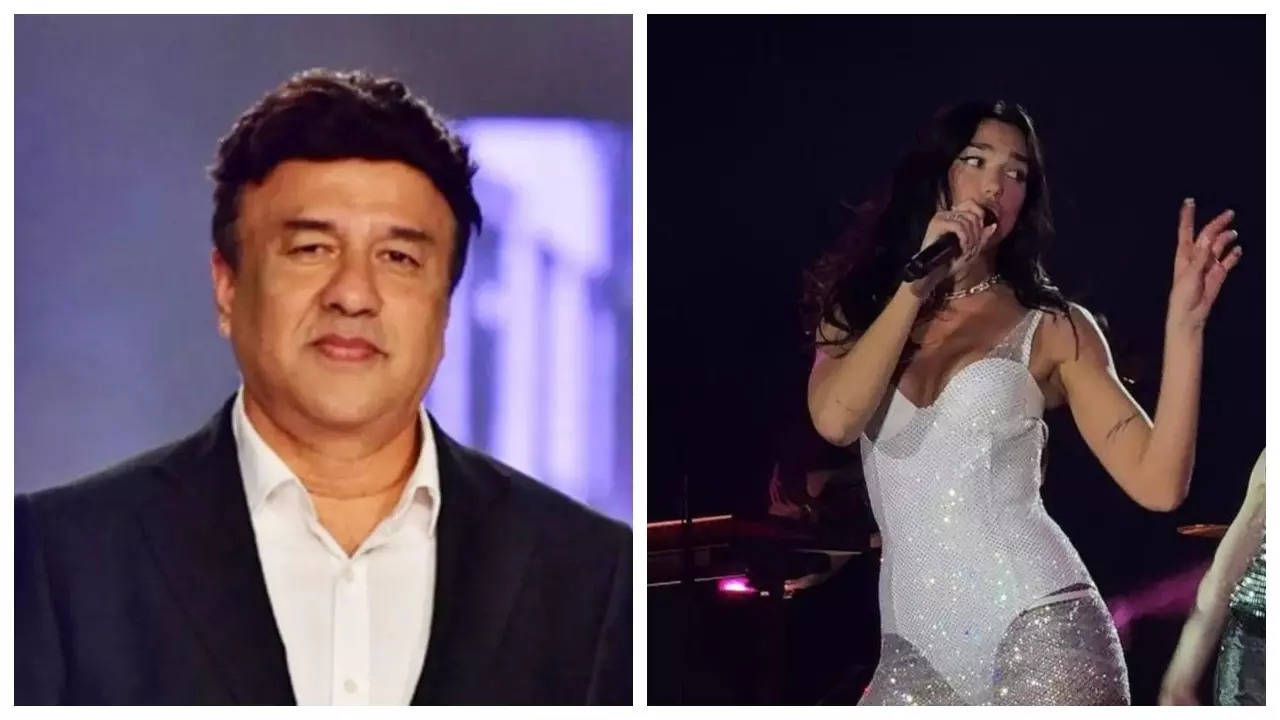A recent clip of global pop star Dua Lipa performing a mashup of her hit Levitating and the Bollywood classic Woh Ladki Jo from the Shah Rukh Khan-starrer Baadshah has taken social media by storm. The performance, part of her concert in Mumbai, struck a chord with Bollywood fans worldwide, who celebrated the unexpected collaboration. However, while the moment left fans elated, it also sparked a debate about crediting the original creators of the Bollywood track—composer Anu Malik and singer Abhijeet Bhattacharya.
Anu Malik: A Positive Perspective on a Global Stage
Speaking exclusively to News18 Showsha, music director Anu Malik expressed his feelings about the viral clip. While he acknowledged the need for proper credit, he chose to view the incident through a positive lens.
“Dua Lipa is an incredibly talented and famous singer. It’s an honor to see her perform my tune on such a massive stage. It’s heartening that Woh Ladki Jo has reached a global audience, showing that Indian music can sway the hearts and minds of international artists,” Malik shared.

Malik recounted the flood of messages he received after the clip went viral, including one from his own daughter. “The whole world, including my daughter, sent me this clip saying, ‘You’re everywhere. Dua Lipa is dancing to your song.’ I was very happy. I have no issues with it. Dua is a fantastic performer, and she blended my tune seamlessly into her act.”
The Issue of Credit and Recognition
While Malik appreciates the recognition his music received, he emphasized the importance of proper credit. “We can only request that people acknowledge the original creators. Credit should be shared with both me as the composer and Abhijeet as the singer,” he said, adding with humility, “Aaj kal toh hum sirf haath jodke request karte hain (These days, we can only fold our hands and request).”
Malik also expressed his gratitude for the impact Shah Rukh Khan’s presence in Baadshah had on the song’s popularity. He noted, “Shah Rukh Khan’s charisma took my composition to another level. I thank Dua Lipa for making it even more popular and for recognizing the immense talent of Indian musicians, with me being one of them.”
Curiosity About the Collaboration’s Origins
Although Malik is pleased with the global recognition, he is curious about how the collaboration came to be. He wonders whether his and Abhijeet’s contributions were officially acknowledged in the process.
“I want to know how they got the rights to the song. Did they credit me and Abhijeet, or was it simply taken off the rack? While I’m thrilled that people are celebrating my music, I would appreciate clarity on how the production was handled,” Malik remarked.
Despite this, Malik appreciates the thoughtful incorporation of his tune into Dua Lipa’s performance. “I love how my melody plays in the background. The production quality is outstanding, and I’m grateful for the recognition,” he added.
The ‘Unlikely Collaboration’ Debate
While many fans praised the mashup as a cultural blend, others referred to it as an “unlikely and unusual collaboration,” a phrase that Malik found disheartening. “What do they mean by ‘unlikely and unusual’? They should be proud that an Indian composer’s melody has reached the global stage. I’ve been working for 47 years, and it’s a joy to see my music appreciated worldwide,” he said.
.jpg)
Malik also pointed out that Indian music has frequently been featured on international platforms. “My song Chamma Chamma was used in the film Moulin Rouge. Aaja Na Chhu Le Meri Chunari Sanam was in Monsoon Wedding. I’ve composed for Gurinder Chadha’s Bride & Prejudice. Balle Balle is played at weddings even today. So, when they call this an ‘unlikely combo,’ it doesn’t sit well with me. Respect should be given where it’s due.”
A Legacy of Indian Music on the Global Stage
Malik highlighted that this isn’t the first time Indian music has gained international acclaim. Songs from Bollywood have long been celebrated in global cinema, showcasing the universal appeal of India’s vibrant musical culture.
For Malik, moments like these reaffirm the global potential of Indian talent. “We’re proud Indians, and I’m thrilled that my melody resonates globally. It’s a testament to the hard work of musicians in our country. I thank Dua Lipa for giving my tune a new lease of life and for introducing it to audiences who may not have heard it otherwise.”
Conclusion: Bridging Cultures Through Music
Dua Lipa’s performance of Levitating X Woh Ladki Jo stands as a beautiful example of how music transcends boundaries and brings cultures together. While the debate over proper credit continues, Anu Malik’s positive outlook reflects his pride in seeing Indian compositions celebrated on a global stage.

As Malik aptly concluded, “Music knows no boundaries. It connects hearts and minds across the world. I’m grateful that my work has made its way into such a significant moment, and I look forward to more opportunities for Indian music to shine on international platforms.”
The mashup not only highlights the global influence of Bollywood but also emphasizes the importance of acknowledging the creators behind the melodies that captivate millions.

